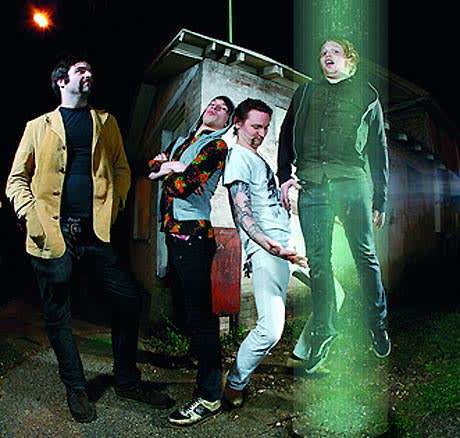"Being progressive isn't a dirty word," sighs Daughters vocalist Alexis S.F. Marshall. "Maybe people think of Styx or something but I don't think it's bad at all. It's necessary." Initially dubbed mathcore yet continually breaking down that constricting definition over the course of their nine years, the Providence, Rhode Island quartet (completed by guitarist Nicholas Andrew Sadler, drummer Jonathan Syverson and bassist Samuel Moorehouse Walker) once again redefines internal parameters with third full-length Daughters.
The band's longest, most intense affair yet at 28 minutes, Daughters is another audacious step away from their originally ephemeral blasts of chaos. It's a freakish middle ground between avant-garde jazz's frenetic attack, punk rock belligerence and metal's ungainly power. Fiercely proud of the results yet expecting astounded ― possibly dismayed ― fans, Marshall proactively defends the band's continual sonic shift.
"I went into the studio and I just couldn't scream," he admits. "I'm evolving. You witness bands from when they're 17 until their 40s. It's silly and lazy for them to play the same shit over and over again. We're constantly discovering more about ourselves musically and emotionally, so we're ever-changing. To say that Daughters is gonna play 30-second songs and scream for the next 25 years is skewed. We're becoming different people."
While Daughters is bold, it's to be expected. Seemingly chaotic yet actually meticulous, the union of jarring time shifts, scratchy guitars and Marshall's cleaner vocals is the perfect successor to 2006's Hell Songs. "Everyone should progress in life. For people to demand that others stay stagnant because it's what they want is selfish. And there are millions of bands. There's some jerk starting a band in his basement right now. There are always other books to read or records to buy. If you don't like some band's sound now, move on already."
The band's longest, most intense affair yet at 28 minutes, Daughters is another audacious step away from their originally ephemeral blasts of chaos. It's a freakish middle ground between avant-garde jazz's frenetic attack, punk rock belligerence and metal's ungainly power. Fiercely proud of the results yet expecting astounded ― possibly dismayed ― fans, Marshall proactively defends the band's continual sonic shift.
"I went into the studio and I just couldn't scream," he admits. "I'm evolving. You witness bands from when they're 17 until their 40s. It's silly and lazy for them to play the same shit over and over again. We're constantly discovering more about ourselves musically and emotionally, so we're ever-changing. To say that Daughters is gonna play 30-second songs and scream for the next 25 years is skewed. We're becoming different people."
While Daughters is bold, it's to be expected. Seemingly chaotic yet actually meticulous, the union of jarring time shifts, scratchy guitars and Marshall's cleaner vocals is the perfect successor to 2006's Hell Songs. "Everyone should progress in life. For people to demand that others stay stagnant because it's what they want is selfish. And there are millions of bands. There's some jerk starting a band in his basement right now. There are always other books to read or records to buy. If you don't like some band's sound now, move on already."
